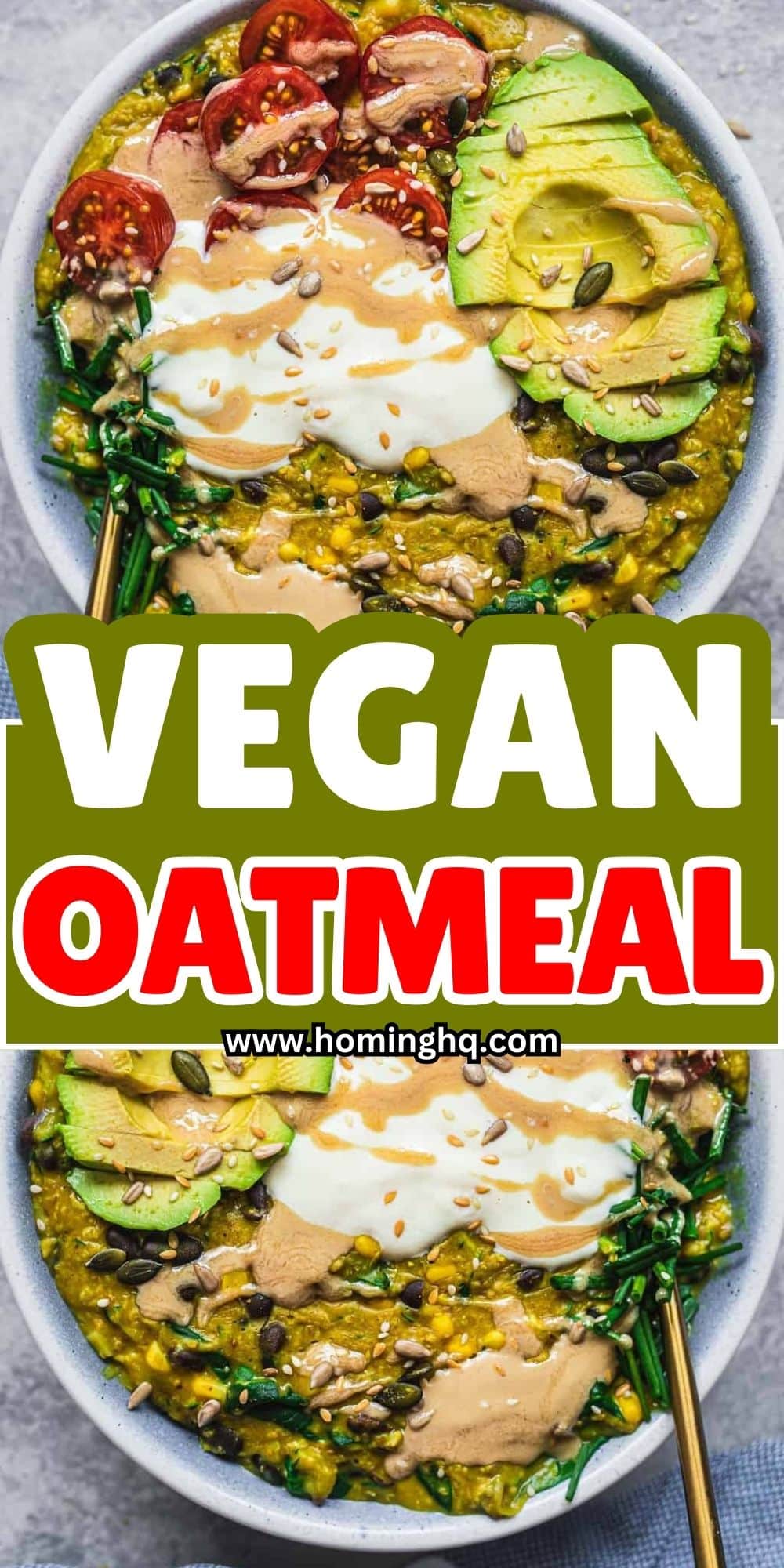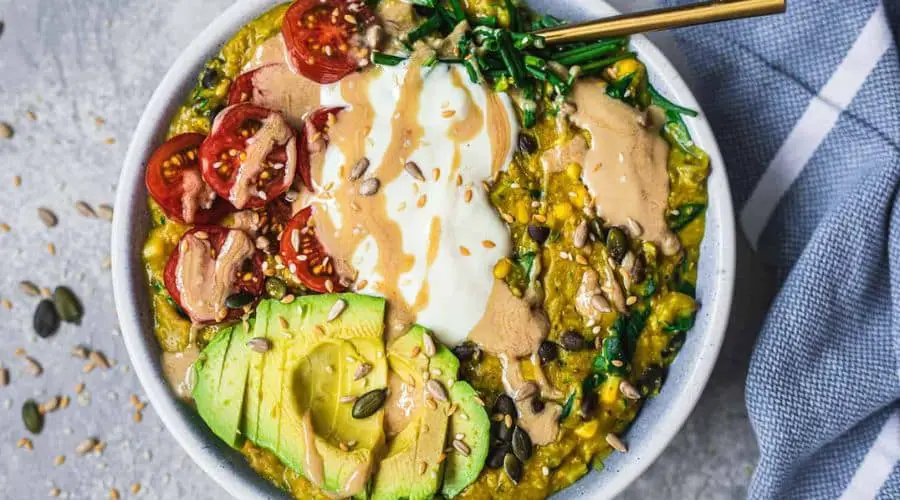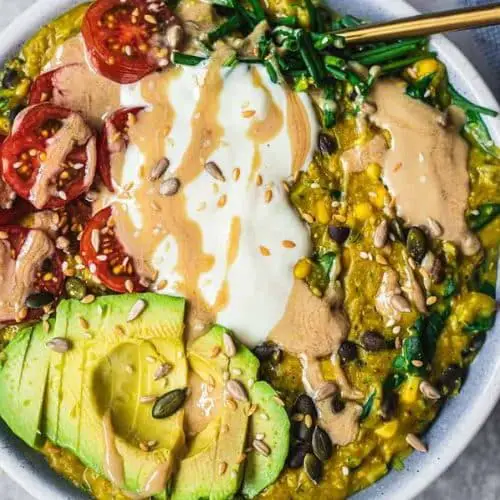All products are selected by our editorial team for quality. If you buy through our links, we may earn a small commission at no extra cost to you.
Oatmeal is a classic breakfast choice that has been enjoyed for centuries.
Its comforting warmth, simple preparation, and ability to fuel the body for the day ahead make it a favorite for many.
For those following a plant-based lifestyle or looking for a healthier, dairy-free alternative, vegan oatmeal is an excellent option.
By swapping out traditional milk for plant-based varieties and leaving out animal products, you can create a nourishing bowl that is not only delicious but also kind to the planet.
In this post, we’ll explore what vegan oatmeal is, the health benefits it offers, the key ingredients you’ll need to make it, and how to customize it to suit your taste.

What is Vegan Oatmeal?
Vegan oatmeal is simply oatmeal made without any animal-based products.
Traditionally, oatmeal is made by cooking oats with water or milk, but in the vegan version, plant-based milk such as almond, oat, or coconut milk is used instead of dairy.
This substitution gives the oatmeal a creamy texture while keeping it completely dairy-free. In addition, the sweeteners and flavorings used in vegan oatmeal are plant-based, and toppings can be adjusted to suit dietary preferences.
The beauty of vegan oatmeal lies in its versatility—whether you prefer it sweet or savory, thick or creamy, there are endless possibilities to make it your own.
Health Benefits of Vegan Oatmeal
Vegan oatmeal offers numerous health benefits, making it a wonderful addition to your breakfast routine.
Oats themselves are a rich source of soluble fiber, particularly beta-glucan, which can help lower cholesterol levels and support heart health.
This fiber also aids in digestion, promotes feelings of fullness, and helps regulate blood sugar levels.
When combined with plant-based milk and other wholesome ingredients, vegan oatmeal becomes an even more nutritious choice.
It provides essential vitamins, minerals, and antioxidants, supporting everything from immune function to skin health.
Furthermore, vegan oatmeal is naturally free of animal products, making it a perfect option for those on a plant-based or vegan diet.
It’s an excellent way to start the day with a filling meal that’s also cruelty-free and environmentally friendly.
By choosing plant-based milk, you are also cutting down on your intake of saturated fat, which is found in cow’s milk and linked to various health issues.
Vegan oatmeal is a nourishing, energy-boosting breakfast that supports overall health and well-being.
Key Ingredients for Vegan Oatmeal
To make vegan oatmeal, you’ll need just a few simple ingredients.
The star of the dish is, of course, the oats. Rolled oats are the most commonly used variety, as they cook up quickly and offer a creamy texture.
Steel-cut oats can be used for a chewier, more textured oatmeal, but they take longer to cook.
Instant oats are another option, though they tend to lose some of the nutritional value compared to rolled oats.
Next, you’ll need a plant-based milk. The type of milk you choose can greatly affect the flavor and creaminess of your oatmeal.
Almond milk, oat milk, and soy milk are popular choices, each offering a mild flavor that blends well with oats.
Coconut milk adds a slightly richer, tropical taste, while cashew milk creates a creamy texture.
Sweeteners and flavorings will enhance the taste of your oatmeal.
Maple syrup, agave, and date syrup are excellent natural sweeteners that bring out the sweetness in the oats without relying on refined sugar.
A dash of vanilla extract and a sprinkle of cinnamon or nutmeg can add depth and warmth to the flavor.
If you like your oatmeal a little savory, you can experiment with herbs and spices like turmeric or black pepper.
Lastly, don’t forget the toppings. Vegan oatmeal is a canvas for your creativity.
Fresh or dried fruits, nuts, seeds, and nut butter are just a few ideas for topping your bowl.
You can even add a scoop of protein powder or chia seeds for an extra boost.
The beauty of vegan oatmeal is how customizable it is, so feel free to mix and match ingredients to find your perfect combination.
How to Make Vegan Oatmeal: Step-by-Step Recipe

Making vegan oatmeal is simple and quick, and you can easily adjust the recipe to suit your tastes.
Here’s how to make a basic bowl of creamy vegan oatmeal:
Step 1: Choose Your Oats and Milk
Start by selecting your oats. Rolled oats are a great choice for a creamy and soft texture, while steel-cut oats provide a heartier bite.
Instant oats are convenient but tend to have a softer consistency. Once you’ve chosen your oats, select a plant-based milk.
Almond milk, oat milk, or soy milk are all good options, but feel free to experiment with others based on your taste preferences.
Step 2: Combine Oats and Plant-Based Milk
In a medium-sized pot, combine 1 cup of oats with 2 cups of your chosen plant-based milk.
If you prefer a thicker oatmeal, you can use less milk, or add more for a creamier consistency.
Stir the mixture to ensure the oats are evenly coated with milk.
Step 3: Cook and Stir
Place the pot on medium heat and bring the mixture to a simmer. Stir occasionally to prevent the oats from sticking to the bottom of the pot.
Allow the oatmeal to cook for about 5 to 10 minutes, depending on your desired consistency.
Stir it every few minutes to ensure it cooks evenly and doesn’t burn.
Step 4: Add Sweeteners and Flavorings
Once the oats have absorbed the milk and reached your desired consistency, it’s time to add flavor.
Stir in a tablespoon of maple syrup or another sweetener of your choice.
Add a pinch of cinnamon, a dash of vanilla extract, or any other flavorings you like.
Continue to cook for an additional minute or two, stirring well to combine.
Step 5: Adjust Consistency and Serve
If you find your oatmeal is too thick, simply add a splash more plant-based milk and stir to loosen it up.
Once it’s just the right consistency, remove from heat and serve hot. Now it’s time to add your favorite toppings!
Vegan Oatmeal Variations and Customizations
Vegan oatmeal is highly customizable, allowing you to create a breakfast that suits your taste and dietary preferences.
Here are some ideas to switch up the basic recipe:
Toppings: Create Your Perfect Oatmeal Bowl
Toppings are one of the best ways to personalize your vegan oatmeal.
Fresh fruits like berries, bananas, or apple slices add natural sweetness and texture.
Nuts and seeds—such as almonds, walnuts, chia seeds, or flaxseeds—provide a satisfying crunch and extra nutrients.
Nut butters like almond or peanut butter add creaminess and protein.
For a more indulgent option, drizzle your oatmeal with coconut yogurt or a dollop of dairy-free whipped cream.
Flavor Combinations: Get Creative with Flavors
The beauty of vegan oatmeal is that you can tailor the flavor to fit any mood or craving. Here are a few flavor combinations to try:
- Banana Nut Oatmeal: Add mashed bananas while cooking and top with crushed walnuts or pecans.
- Apple Cinnamon Oatmeal: Stir in diced apples and cinnamon during cooking for a classic flavor, then top with a drizzle of maple syrup.
- Chocolate Peanut Butter Oatmeal: Mix in cocoa powder and peanut butter for a rich and satisfying treat.
- Tropical Oatmeal: Add coconut milk, pineapple, and shredded coconut for a tropical twist.
Extra Add-ins: Boost Your Oatmeal’s Nutritional Value
For a more nutrient-dense breakfast, try adding extras like:
- Chia Seeds or Flaxseed: These tiny seeds are packed with omega-3 fatty acids, fiber, and protein.
- Protein Powder: Stir in a scoop of plant-based protein powder for an extra protein boost, especially if you’re on the go.
- Spirulina or Matcha Powder: For an antioxidant kick, consider adding superfoods like spirulina or matcha powder.
- Coconut Flakes or Cacao Nibs: If you’re craving something a bit sweeter or more exotic, sprinkle in some unsweetened coconut flakes or raw cacao nibs for added flavor and crunch.
Overnight Vegan Oatmeal: Make It the Night Before
For those busy mornings, overnight oats are a convenient and delicious option.
To make overnight vegan oatmeal, simply combine your oats and plant-based milk in a jar or container, add your sweetener and flavorings, and let it sit in the fridge overnight.
In the morning, you’ll have a ready-to-eat, creamy oatmeal that requires no cooking.
You can enjoy it cold, or warm it up for a few minutes in the microwave.
By experimenting with these variations and customizations, you can create a unique bowl of vegan oatmeal each day that meets your dietary preferences and cravings.
Common Mistakes to Avoid When Making Vegan Oatmeal
Making vegan oatmeal is easy, but there are a few common mistakes that can affect the texture or flavor of your dish. Here are some things to keep in mind:
1. Overcooking the Oats
One of the most common mistakes is cooking the oats for too long.
Oats can become mushy and lose their texture if cooked beyond the point of doneness.
It’s important to monitor the cooking process and stop when the oats have absorbed most of the liquid but are still soft and slightly chewy.
For steel-cut oats, this may take a bit longer, while rolled oats cook more quickly.
2. Not Stirring Enough
If you don’t stir the oats regularly while cooking, they can stick to the bottom of the pan and burn.
Stirring every couple of minutes ensures even cooking and prevents sticking.
This also helps to create a creamier texture by breaking up the oats slightly as they cook.
3. Using Too Much or Too Little Liquid
The consistency of your oatmeal largely depends on the ratio of oats to liquid.
Using too much liquid will result in runny oatmeal, while too little liquid can leave the oats dry and undercooked.
A general rule of thumb is to use 2 cups of plant-based milk for every 1 cup of rolled oats.
Adjust according to your preferred texture.
4. Not Adjusting the Flavor
Vegan oatmeal can be bland if you don’t properly season it. Don’t skip the vanilla extract, cinnamon, or sweetener.
Experiment with different flavors to enhance the oatmeal’s taste, and remember to add a bit of salt, as it can bring out the natural sweetness of the oats.
5. Forgetting to Add Toppings
Toppings are essential for adding texture, flavor, and nutrients to your oatmeal.
Don’t overlook this step—add fresh fruits, nuts, seeds, or even a dollop of plant-based yogurt.
These additions not only enhance the taste but also make the meal more satisfying.
Conclusion
Vegan oatmeal is a delicious, nutritious, and customizable breakfast that can fit any dietary preference.
With just a few simple ingredients—such as oats, plant-based milk, and sweeteners—you can create a satisfying meal that fuels your body and warms your soul.
By experimenting with different toppings, flavors, and add-ins, you can create an oatmeal bowl that’s uniquely yours.
And with its numerous health benefits, including heart-healthy fiber, antioxidants, and essential nutrients, vegan oatmeal is a great choice to start your day on the right note.
Whether you’re looking for a quick weekday breakfast or a make-ahead meal, vegan oatmeal is versatile enough to meet all your needs.
Frequently Asked Questions About Vegan Oatmeal
1. Can I use any type of plant-based milk for vegan oatmeal?
Yes, you can use any plant-based milk you prefer, such as almond milk, oat milk, coconut milk, or soy milk.
Each type of milk will provide a slightly different flavor and texture, so feel free to experiment to find what you like best.
2. How can I make my oatmeal creamier?
To make your oatmeal creamier, use a richer plant-based milk, like coconut milk or cashew milk.
You can also stir in a spoonful of nut butter or add a bit of coconut cream for extra richness.
3. How do I store leftovers?
Leftover vegan oatmeal can be stored in an airtight container in the refrigerator for up to 3 days.
To reheat, simply add a splash of plant-based milk and warm it up on the stovetop or in the microwave.
4. Can I prepare vegan oatmeal the night before?
Yes! You can prepare overnight oats by mixing the oats, plant-based milk, sweetener, and flavorings the night before.
Let it sit in the refrigerator overnight, and it will be ready to eat in the morning, either cold or warmed up.
5. Is vegan oatmeal gluten-free?
Oats themselves are naturally gluten-free, but cross-contamination can occur during processing.
To ensure your oatmeal is gluten-free, look for certified gluten-free oats, which are processed in facilities that prevent cross-contact with gluten-containing grains.

Vegan Oatmeal
Equipment
- 1 medium pot
- 1 measuring cup
- 1 Wooden spoon or spatula
- 1 serving bowl
Ingredients
- 1 cup rolled oats
- 2 cups plant-based milk such as almond, oat, or coconut milk
- 1 tbsp maple syrup or sweetener of choice
- 1/2 tsp ground cinnamon optional
- 1/4 tsp vanilla extract optional
- Pinch of salt optional
- Toppings of your choice e.g., fresh fruit, nuts, seeds, nut butter
Instructions
- Combine oats and milk: In a medium pot, add 1 cup of rolled oats and 2 cups of your chosen plant-based milk.
- Cook the oatmeal: Place the pot over medium heat and bring the mixture to a simmer, stirring occasionally.
- Simmer and stir: Let the oatmeal cook for about 5-10 minutes, stirring every few minutes to prevent it from sticking. Adjust the heat as needed to prevent boiling over.
- Add flavorings: Once the oats have absorbed most of the milk and are at your desired consistency, stir in the maple syrup, cinnamon, vanilla extract, and a pinch of salt.
- Serve: Pour the oatmeal into bowls and add your favorite toppings like fresh fruit, nuts, or nut butter. Serve immediately.
Notes
- Consistency: If you prefer thicker oatmeal, use less milk. For creamier oatmeal, add a little more milk during cooking or after it’s finished.
- Toppings: Experiment with different toppings, such as berries, banana slices, chia seeds, almond butter, or coconut flakes for added flavor and texture.
- Storage: Store leftovers in an airtight container in the fridge for up to 3 days. Reheat with a splash of plant-based milk.
- Make ahead: You can also prepare this oatmeal the night before and reheat it in the morning for a quick, no-cook option.

